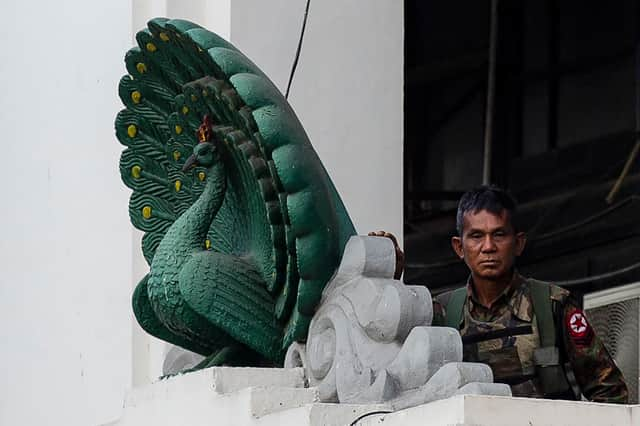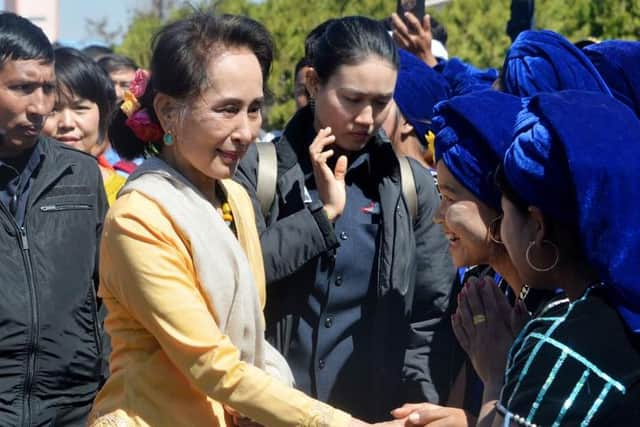The future of 56 million people is hanging in the balance - Fiona MacGregor on the Myanmar coup


After five years of a civilian-led administration and Suu Kyi’s widely-condemned decision to defend the country against international charges of genocide, hints from military leaders last week that they were preparing to take action over alleged election fraud had been widely dismissed as concerning but most likely sabre rattling.
The coup not only undermines the Nobel prize winner and her National League for Democracy party. It also brings with it the very real threat of military violence against expected civilian protests and the likelihood of increased conflict in the country’s ethnic areas where civil wars have been raging on and off for decades.
Advertisement
Hide AdAdvertisement
Hide AdAs I write this, the internet and phone service remain largely cut-off across much of the country, but those of my friends in Myanmar who are managing to get through are expressing a mixture of disbelief and fear.


“I’ve woken to a nightmare” is how one female friend described it. Messages also hint heavily that people are reluctant to comment too much via online communications to which the military almost certainly has access.
A ‘democracy’ built on shaky foundations
It was exactly five years ago today (Feb 02 2016) I stood in the giant, marble halls of Myanmar’s parliament and witnessed the Nobel Prize winner and her National League for Democracy colleagues file in to take their seats as the first civilian-led, largely-democratically elected government to lead the country in decades.
The chamber, once dominated by a sea of green military uniforms, was suddenly awash with the optimistic burned-orange red of the NLD’s party shirts and colourful traditional garb of representatives from long-oppressed ethnic minority groups.


Still, Aung San Suu Kyi – who like many of Myanmar’s former political prisoners practiced Buddhist meditation during her years under military detention – maintained her trademark expressionless stare as she entered parliament by a side door that day. She was likely very conscious of how a bold display of victory would have played out among an arrogant and chauvinistic military leadership still smarting at the scale of her win.
The generals had previously ignored legitimate NLD victories, holding Aung San Suu Kyi under house arrest, and the military-drafted 2008 constitution ensures key ministries and 25 per cent of parliamentary seats are guaranteed to go to the military. The new “democracy” was at best only partial and highly vulnerable to military intervention.
Myanmar, like the USA, holds its elections in November and has a similarly long gap between the election and the new/or continuing government being officially installed at the start of February. As we have just seen play out in the USA, such periods can be fraught with danger.
For weeks after her first election victory, the military refused to confirm if they would hand over power. I was thrown out of the office of a senior government minister in the capital Naypyitaw who was infuriated by me pressing him for an answer around that issue. He seemed slightly in shock over the whole situation; unable to fully accept the scale of his party’s defeat. A peaceful handover was far from assured.
Advertisement
Hide AdAdvertisement
Hide AdMost disturbingly of all was the assassination of U Ko Ni. The NLD Muslim lawyer who had cleverly crafted a way round the clause in the military drafted constitution that effectively barred Suu Kyi from ever being president because she had foreign born children. Ko Ni’s work raised her “above the president’ through the specially created position of “state councillor”. He was shot at close range in the head at Yangon airport while holding his baby grandchild. I was sitting in a garden with journalist friends when I heard the news. Grief for the death of a much-admired man mixed with fear of genuine what it meant for the country. In the end the transition went ahead without further violence and Suu Kyi claimed her position. The country was full of hope.
But her silence on the killing which happened just days before she was due to take power, and her refusal even to contact Ko Ni’s family, horrified many observers who saw it as another sign of her failure to engage on threats to Myanmar’s Muslims. Others believed she was too scared to stand up to the generals – although the military has never accepted responsibility for the killing. It is likely both interpretations of her reticence held some truth.
A sign of things to come
Ultimately, it has been her complicity in the killings and oppression of Myanmar’s Muslims that has come to be define Suu Kyi’s rule so far in terms of international perceptions. Her initial failure to speak out against the brutal military operations in 2016 and 2017 that killed countless and forced hundreds of thousands of Rohingya Muslims over the border into Bangladesh was seen by people across the globe as a clear betrayal of her iconic status. Her latter defence of the violence amid accusations of genocide in the International Court of Justice – cemented her international fall from grace.
Yet her popularity among the vast majority of Myanmar voters has remained as powerful as ever. Prediction that the uptick in conflict in ethnic areas since she came to power would see her NLD party lose seats to ethnic parties, or that her failure around various economic policies would lead some voters to support the military-backed opposition party the USDP, did not come to pass. Instead “Mother Suu” as she is widely adored through the ethnic-majority Bamar heartlands claimed a second great election victory and was due to take power for a second term.
It was apparent from the outset that the military was once again taken back by the humiliating scale of their defeat. Buoyed no doubt by the Trumpian cries of “election fraud” echoing around the world, Myanmar’s generals asserted their own allegations against the NLD and demanded an inquiry by Union Election Commission, which last week found the claims of irregularities unfounded.
Clearly there has been far more at stake than a genuine belief they have been defrauded of a rightful win or even bruised military egos. A number of observers have pointed out that Min Aung Hlaing – the country’s commander in chief and most senior general - is fast-approaching his due retirement date. It places the man who was ultimately responsible for atrocity crimes against the Rohingya and others in a highly vulnerable position personally, while questions over who will choose his successor and how that will impact civil/military relations create further concerns for the military as a whole.
With Gambia leading the charge, and Northern hemisphere governments indicating increasing support, the Myanmar military faces increasing legal, political and economic scrutiny relating its alleged genocide and ethnic cleansing of the Rohingya. It was widely recognised that the military’s previous openness to “democratic transition” reflected a desire to free the country from China’s economic grip and build better relationships with the West. But as those relationships have become increasingly soured, it would not be surprising to see the generals turn once more towards Beijing and in doing so freeing themselves from any real need to commit to democracy.
When Min Aung Hlaing threatened to rip up the constitution over fraud allegations last week, international observers and diplomats took the threat of a coup seriously. But looking back on the post-election tensions in 2016, many believed he was unlikely to follow through.
Advertisement
Hide AdAdvertisement
Hide AdIn the end he did not have to change the constitution. The document, drafted after all by generals, includes a clause enabling the Commander in Chief to take over in a state of emergency. It has allowed him to interpret a legitimate election victory as a threat to the future of the nation and move to secure his own future and reinforce military power in the name of securing the country.
What now?
If there was any truth in the views of those observers who claimed Suu Kyi’s defence of the military’s crimes against humanity were due to fear of what the generals would do if she didn’t support them, the events of the last few days must seem hollow vindication. For if her willingness to betray the most vulnerable and marginalised in her country was some kind of immoral sacrifice for the perceived “greater good” of her retaining power to defend the Buddhist Bamar majority, it has certainly not paid off.
Never-the-less for all Suu Kyi’s condemnable complicity and silence over the atrocities which have occurred under her watch, it is important to recognise that it was not she who ordered or coordinated the violence. The people who did so are the ones who have just taken over.
Those observers who have expressed Schadenfreude over her loss of power, must recognise that a military takeover will only damage the prospects for peace and security for everyone, further distance any hopes the Rohingya might have of a safe return and weaken the influence of those seeking to support human rights in Myanmar.
Suu Kyi must face the judgement of history and possibly even the courts for her betrayal of the Rohingya, other ethnic minorities and the critics jailed on her watch under politically motivated “defamation” charges.
But however much of the democratic progress was an illusion and however culpable Suu Kyi, the last few years have seen the country continue to open up and a new generation exposed to global ideas and information in a way the old dictatorship denied their parents and grandparents.
These internet-literate young people are the country’s hope and the military takeover threatens that. It seems unlikely the students and other activists will give up their dreams of real democracy without a struggle, but history has shown the military will have no qualms in using bloodshed to suppress any uprising.
The future of 56 million people is hanging in the balance. As one friend in Yangon “I am terrified what will happen if they cut the internet off completely.”
Advertisement
Hide AdAdvertisement
Hide AdFiona MacGregor worked as an investigative journalist and editor reporting for national and international media on conflict, human rights, politics and gender from Myanmar between 2013 and 2017 before moving to Bangladesh to work on the Rohingya refugee emergency. Since then she has continued to cover regional human rights issues as a freelance reporter and investigative researcher for the UN.